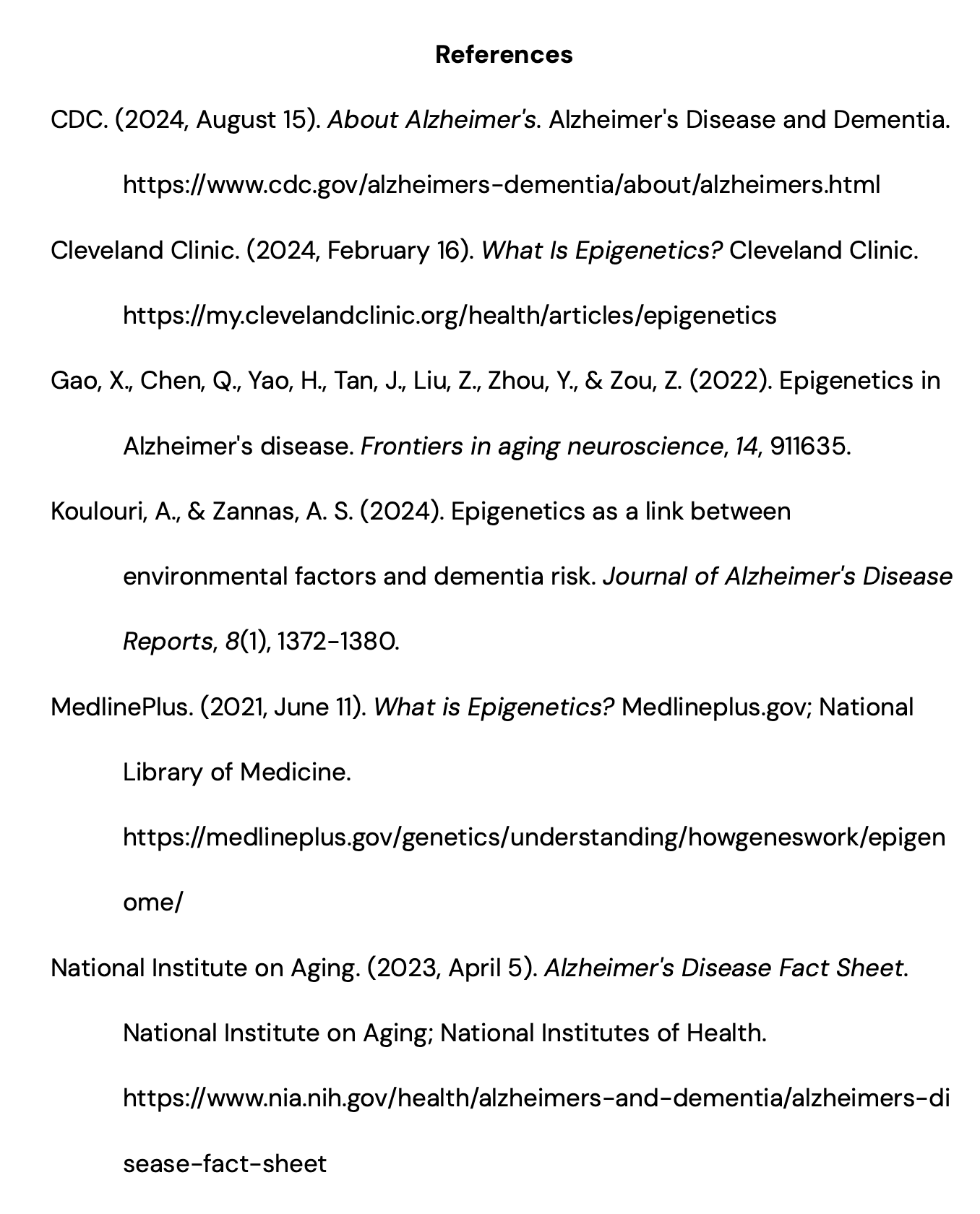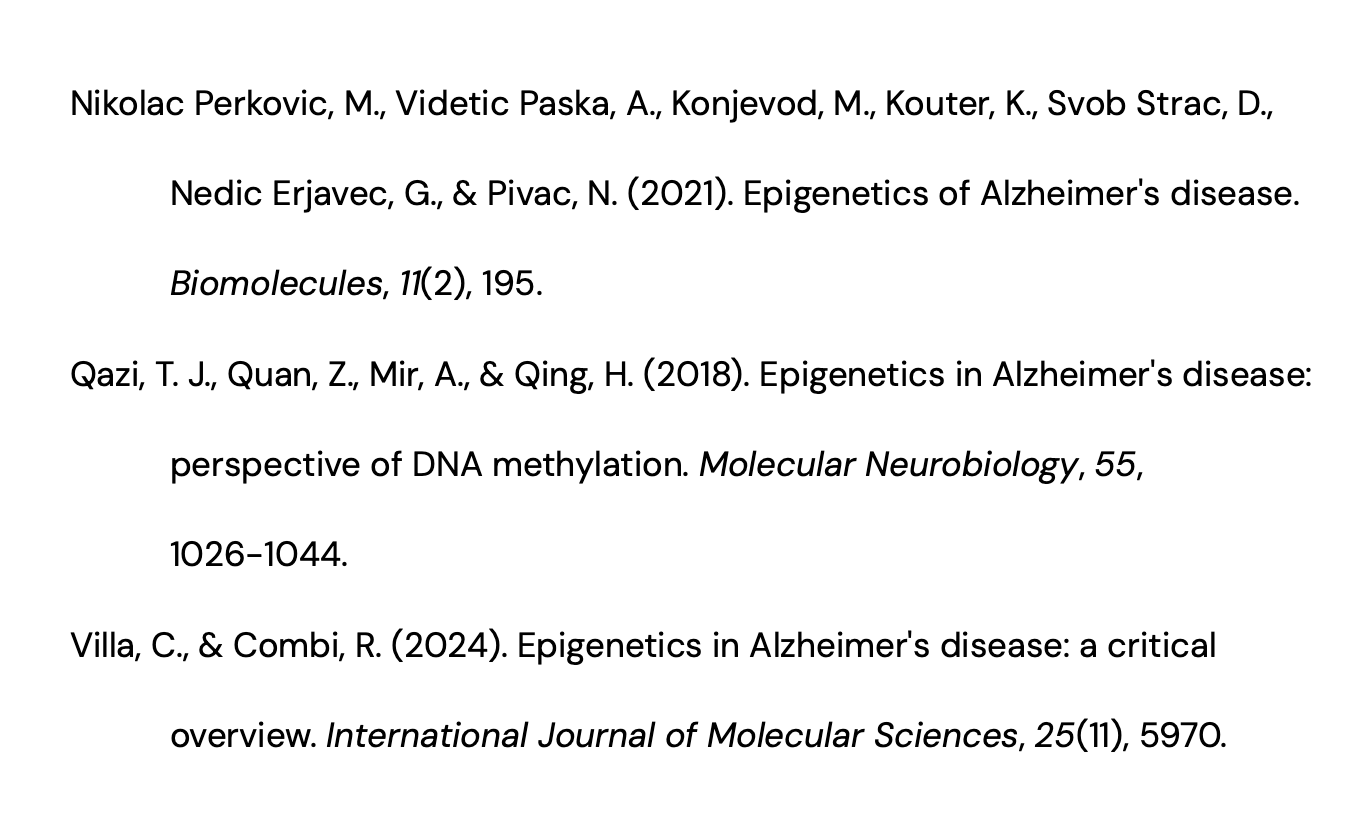Epigenetics in Alzheimer’s
Abstract
Currently, Alzheimer's disease is one of the leading causes of death globally. For years, scientists have held genetics to be one of the most important areas of consideration when it comes to the human body and lifespan. However, a relatively new area of interest, known as epigenetics, has gained recognition. Epigenetics deals with the subtle changes that occur to the human genome throughout an individual’s lifetime, as caused by lifestyle choices and environmental factors. Connections have been found between epigenetics and Alzheimer’s disease, leading scientists to investigate the epigenetic causes and solutions to this illness. So far, multiple genetic alterations have been identified, as well as their epigenetic roots. But while epigenetics can have unfavorable effects on the human genome, people can also adopt lifestyle changes that produce favorable results. Combining these changes with innovative medications that target the epigenome could lead to the next great advancement in the fight against Alzheimer’s.
Introduction to Alzheimer’s
Alzheimer’s disease is the world’s most common form of dementia. It is a neurodegenerative disorder that is the result of nerve damage in the brain ("About Alzheimer's," 2024). The cognitive impairment associated with it is primarily characterized by memory failure, specifically short-term memory loss that’s distinguished by an inability to recall recent memories ("Alzheimer's Disease," 2023) and (Qazi et al., 2018). Additionally, it can cause “deficits in executive, language, and/or visuospatial functions, behavioral changes, and consequently death” (Perkovic et al., 2021). It’s a progressive disease, meaning the symptoms worsen over time, and sadly, it’s currently listed as the seventh most common cause of death in the United States ("About Alzheimer's," 2024) and ("Alzheimer's Disease," 2023).
Pathologically speaking, Alzheimer’s disease is the result of “extraneuronal amyloid plaque (Aβ) deposition and intracellular neurofibrillary tangles (NFTs)” (Gao et al., 2022). The devastating effects of this illness have prompted experts to search diligently for its causes and potential remedies.
What is Epigenetics?
Epigenetics is a branch of gene-related science that deals with regulation and changes in gene activity that don’t involve alterations in the actual DNA sequence ("What is epigenetics?," 2021). It is considered the intersection of genetics and developmental biology (Gao et al., 2022). The epigenome can affect things such as metabolism, cancer development, intellectual disabilities, autoimmune diseases, and a range of other physiological conditions ("Epigenetics," 2024). Some prominent factors that can shape the epigenome include childhood trauma, diet throughout life, exercise, relationships, and exposure to toxins ("Epigenetics," 2024). Essentially, epigenetics determines whether genes are turned on or off ("What is epigenetics?," 2021).
Some major epigenetic mechanisms include histone modification, DNA methylation, and non-coding RNAs (Qazi et al., 2018), with the most prominently researched epigenetic factor regarding Alzheimer’s being DNA methylation (Koulouri and Zannas, 2024). DNA methylation is when chemical groups known as methyl groups attach to nucleotides, turning that gene off and preventing protein synthesis from occurring with it (Gao et al., 2022). Specifically, a methyl group gets attached to the 5th atom of a cytosine base. This impairs transcription of the affected gene by preventing transcription factors from binding to promoters, modifying chromatin structure to make it inaccessible, etc. (Gao et al., 2022).
How Does Epigenetics Affect Alzheimer’s?
Some epigenetic factors that pertain to neurodegeneration include DNA methylation, histone acetylation, and microRNAs, though there are several more (Koulouri and Zannas, 2024). Recent research has shown strong connections between epigenetics and Alzheimer’s disease, specifically regarding DNA methylation (Perkovic et al., 2021). Some studies have revealed that cytosine methylation in the human genome is reduced as a person grows older, especially in Alzheimer’s patients, proving the correlation between the disease and the epigenome (Qazi et al., 2018).
While there are a plethora of hypotheses analyzing which specific genes are implicated, one notable example is the tau hypothesis, which posits that irregular methylation patterns cause downregulation of a certain polypeptide known as the tau protein, and inhibits its transcription (Qazi et al., 2018). Basically, these alterations hamper synaptic plasticity and damage memory-related gene function (Gao et al., 2022). The factors influencing these modifications of the epigenome can include a diet that lacks fundamental nutrients, limited exercise, and social isolation/loneliness ("Alzheimer's Disease," 2023). In addition, epigenetic biomarkers of the disease have been located in the blood and human cerebrospinal fluid (Perkovic et al., 2021).
Strategies to Prevent Alzheimer’s
Knowing that the epigenome can change, individuals can take steps to alter their epigenetics and produce positive impacts. For one, maintaining a healthy diet is vital, especially regarding proper nutrition. Calorie restriction has shown to have neuroprotective effects against Alzheimer’s, namely by employing histone deacetylases, which provide benefits such as boosting mitochondrial performance levels and mitigating oxidative stress (Koulouri and Zannas, 2024). Overall, the benefits of a well-thought diet significantly influence the brain’s resilience against aging, and nutrition is a key player in staving off neurodegenerative disease.
Regulating lifestyle choices such as smoking and psychological stress are also important to dilute risk of developing neurodegenerative maladies (Villa and Combi, 2024). Similarly, maintaining a healthy exercise routine and cultivating a good relationship with stress are key to sustaining cognitive abilities. In terms of medicinal implications, histone deacetylase inhibitors (HDACi) can offset the genetic effects of Alzheimer’s, including tau protein phosphorylation, Aβ accumulation, and poor synaptic plasticity (Perkovic et al., 2021). Further, it can aid in memory consolidation and learning capabilities (Perkovic et al., 2021).
Conclusion
Alzheimer’s disease has shown its prevalence in the modern world, and researchers have made it a primary goal to understand its causes, effects, and possible solutions. In order to do this, we need a comprehensive understanding of the biological mechanisms that underlie these diseases. These mechanisms encompass the field of epigenetics, and with a thorough investigation of the link between the epigenome and neurodegeneration, we can get miles closer to finding a more powerful treatment.

